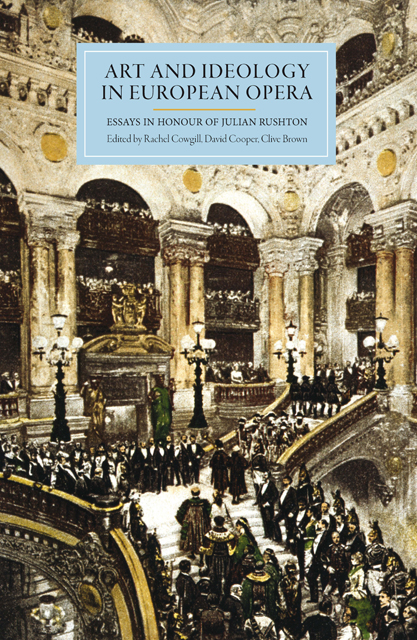Book contents
- Frontmatter
- Contents
- List of Figures
- List of Music Examples
- List of Tables
- Notes on Editors and Contributors
- Acknowledgements
- Introduction
- I Nationalism, Cosmopolitanism and National Opera
- II Opera, Class and the Politics of Enlightenment
- III Opera and Otherness
- Julian Rushton: A Family Memoir
- 7 The Works of Julian Rushton
- Index
- Tabula Gratulatoria
4 - Stanford’s and Le Fanu’s Shamus O’Brien: Protestant Constructions of Irish Nationalism in Late Victorian England
Published online by Cambridge University Press: 28 February 2023
- Frontmatter
- Contents
- List of Figures
- List of Music Examples
- List of Tables
- Notes on Editors and Contributors
- Acknowledgements
- Introduction
- I Nationalism, Cosmopolitanism and National Opera
- II Opera, Class and the Politics of Enlightenment
- III Opera and Otherness
- Julian Rushton: A Family Memoir
- 7 The Works of Julian Rushton
- Index
- Tabula Gratulatoria
Summary
Quite in the opera bouffe style of Gilbert and Sullivan, isn't it! Can't you get Gilbert to do a Home Rule opera comique? The absurdities of the situation are already there. […] English people might see the thing in the true light, if presented in comic songs, with a rattling chorus.
The elevated social status in Victorian England of the Dublin-born composer Charles Villiers Stanford (1852–1924), as Professor of Composition at the Royal College of Music and of Music at Cambridge, may on the surface seem to sit uncomfortably with the sentiments of his opera Shamus O’Brien, the libretto for which, by George H. Jessop, is loosely based on Joseph Sheridan Le Fanu's eponymous ballad celebrating the exploits of an insurrectionary in the United Irishmen's rebellion of 1798. For W. J. McCormack, however, Le Fanu's ballad ‘offers only ambiguous evidence of radical thinking […] The rebel's pride and isolation are authentic. But Shamus is a peasant, one of the ruffian mob, and so his celebration is necessarily undercut by mimicry and sentimental evasion.’ Stanford's Shamus O’Brien was a major popular success, its opening run under Henry Wood playing for eighty-two performances at the Opera Comique, in the Strand, London, from March to May 1896. Granville Bantock subsequently conducted a provincial tour in England and Ireland, and in 1897 the New York run at the Broadway Theatre played for fifty-six performances. However, the opera suffered as a result of its subject matter, and its composer placed an effective veto on it during the period of civil unrest in Ireland in the second decade of the twentieth century, a ban that remained in place until his death in 1924.
Stanford demonstrated staunchly Conservative and Unionist political leanings, and according to Jeremy Dibble, he was a signatory of the anti-Home Rule ‘Ulster Covenant’ of 1912. He was certainly, as Paul Rodmell has demonstrated, extremely antagonistic to Irish political autonomy, and his final days were marked by bitterness towards the recently established Irish Free State.
- Type
- Chapter
- Information
- Art and Ideology in European OperaEssays in Honour of Julian Rushton, pp. 85 - 102Publisher: Boydell & BrewerPrint publication year: 2010

